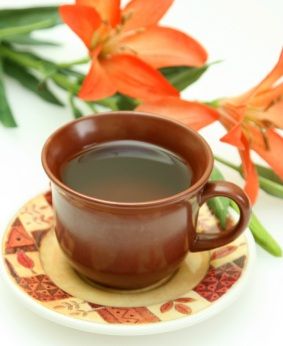Fenugreek Tea
Fenugreek tea anyone?

If you watch Dr. Oz on his daily show, you probably heard him recommend that you drink tea made from fenugreek to soothe digestion. This was part of a show about health secrets from Tibet and other eastern lands.
Although it has been used since ancient times, you may not have heard of this warm and pungent herb from the bean family that is also called Greek clover, Goat's horn, and Bird's foot.
Making tea
The easiest way to make fenugreek tea is to buy the tea bags that are sold in health food stores and online.
However, if you are a purist, you can also make the tea by infusing a teaspoon of fenugreek seeds, which are yellowish in color and very hard, with about two cups of water for five minutes.
The flavor is similar to maple syrup, but with a bitter aftertaste, so it is not for everyone.
Although fenugreek is generally considered safe in the amount you would get in a cup of tea or in foods, you should know that there are some cautions associated with this herb.
It is not recommended for children.
Although fenugreek is recommended for digestive problems, it may cause bloating, gas and diarrhea when taken internally.
It may interact negatively with diabetes meds and anticoagulants that are taken to slow clotting of blood. Be sure to consult your doctor and pharmacist about drug interactions.
It is a uterine stimulant that should probably be avoided during pregnancy.
Although it has long been used for a digestive aid, fenugreek and fenugreek tea also has some other uses.

Medicinal Uses
Most physicians would say that there is not enough scientific evidence to support the use of fenugreek as medicine.
It may be used to stimulate milk production in nursing moms. However, as mentioned above, it should be avoided during pregnancy.
Fenugreek has been used since ancient times as an aphrodisiac and potency aid.
It may be used in the form of a poultice (powdered herb is made into a paste, warmed and wrapped in cloth) to treat skin conditions such as cellulitis, gout, eczema, boils and other local pain and swelling.
It may be useful in lowering blood sugar levels by slowing absorption of sugar and stimulating insulin secretion. If you are diabetic, you should consult your doctor and pharmacist before using it for this purpose.
Most applications use the seeds, but in certain parts of the Middle East, the leaves are used as a remedy for PMS and stomach inflammation.
Culinary uses
Imitation maple syrup may contain fenugreek for flavoring.
It is an ingredient in many curry powders and used to flavor chutneys as well as meat and vegetable dishes in Indian cuisine. The seeds are dried, lightly roasted and ground before use.
“Halva,” a Middle Eastern confection contains fenugreek.
Ground seeds can be roasted and infused as a substitute for coffee.
Other uses
It is sometimes used as an ingredient in cosmetics and cleansing products.
It has been used since ancient times to make a yellow dye.
It's always good to know what you are consuming
Whether or not you decide to take Dr. Oz's advice about fenugreek tea, it is always a good idea to do your research to find out about the things you choose to ingest. That way you won't be surprised by some unintended consequence when you are trying to be healthy and feel well.

